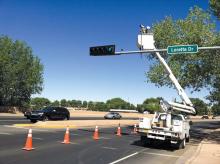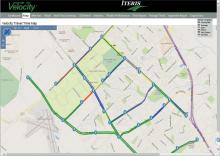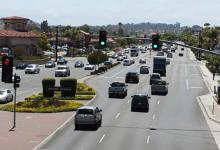Work has begun on a US$343,000 project to install the first adaptive signal control system in Bernalillo County, New Mexico, to improve traffic flow along Alameda Boulevard, which has one of the highest traffic flows in the county. The system is a designated set of traffic signals that effectively communicate with each other and adapt to the traffic flow, reducing the frequency of red lights when traffic volume is high to improve overall traffic flow. County commissioner Lonnie Talbert said: “Up to 50,000 v
Work has begun on a US$343,000 project to install the first adaptive signal control system in Bernalillo County, New Mexico, to improve traffic flow along Alameda Boulevard, which has one of the highest traffic flows in the county.
The system is a designated set of traffic signals that effectively communicate with each other and adapt to the traffic flow, reducing the frequency of red lights when traffic volume is high to improve overall traffic flow.
County commissioner Lonnie Talbert said: “Up to 50,000 vehicles per day travel along Alameda. This system will improve their overall travel time on a daily basis.”
The county will install video detection cameras and the program software for the adaptive signal control system at seven major intersections to collect real-time traffic flow information. The information will be used to optimise the signal timing based on real-time traffic conditions throughout the day. Peak hour traffic flow will be improved by adjusting the green times to improve overall traffic flow while not significantly increasing the wait times on the side streets.
The recent installation of thousands of feet of fibre-optic cable helped to establish the county’s own infrastructure for voice and data communications, which will allow the county to remotely operate and monitor the system from its traffic operations office.
The system is expected to be fully activated by the beginning of September.
The system is a designated set of traffic signals that effectively communicate with each other and adapt to the traffic flow, reducing the frequency of red lights when traffic volume is high to improve overall traffic flow.
County commissioner Lonnie Talbert said: “Up to 50,000 vehicles per day travel along Alameda. This system will improve their overall travel time on a daily basis.”
The county will install video detection cameras and the program software for the adaptive signal control system at seven major intersections to collect real-time traffic flow information. The information will be used to optimise the signal timing based on real-time traffic conditions throughout the day. Peak hour traffic flow will be improved by adjusting the green times to improve overall traffic flow while not significantly increasing the wait times on the side streets.
The recent installation of thousands of feet of fibre-optic cable helped to establish the county’s own infrastructure for voice and data communications, which will allow the county to remotely operate and monitor the system from its traffic operations office.
The system is expected to be fully activated by the beginning of September.









